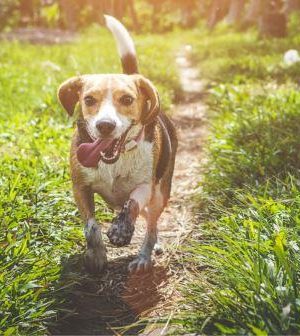- Do you subscribe to Dharma Dog Training’s Newsletter? You should.
- A Unique Campaign from The Humane Society of the United States
- Rabid bats in Omaha- Stay safe, prepared with these tips
- Springtime Activities in Omaha
- Mill Dog Monthly from Bailing Out Benji
- World Spay Day, Legislative Alert in Nebraska
- Attend the Nebraska Rescue Council’s monthly meeting this Saturday
- Five Hard-to-Ignore Reasons to Adopt!
- Paws in Pink to Benefit Breast Cancer Foundation
- VCA, Inc. Acquires MidWest Vet Specialists from Kansas State University
Facts on Why the Behavior of a Dog is Not Breed Specific

Time and time again, we have heard different stories about different dog breeds. Some dog breeds, such as Labrador Retrievers and Goldens, are notorious for being great family dogs.
Other pups, such as Pit Bulls and Rottweilers, get a bad rep for being violent. The Truth is this stereotype is being broken down because studies show that a dog’s behavior is not breed-specific.
In fact, a new study in the journal Science indicates that only 9% of the behavior of a canine is related to the breed. Furthermore, in this study, they were able to take a significant sample size confirming the accuracy of the data. So, let’s dive deeper into this and explore some of these facts that prove behavior is not breed-specific for dogs.
Dog Breed Stereotypes Are Not Supported by Data
Dog trainers are the first to admit that breed hardly indicates how well-behaved a dog will be. They show you that your belief about certain breeds having specific behaviors is false. Dogs will behave differently despite them being of the same breed.
The study mentioned above talks about how most breeds have heritable behaviors. This means that they can be trained through commands. So, you can shape your dog’s behavior by investing in their training either by yourself or hiring a professional.
Dogs like Chihuahuas are commonly mislabeled as aggressive dogs, whereas labs are family-friendly. Unfortunately, such stereotypes tend to alienate certain dogs, not realizing that a dog’s behavior and personality are individual.
Common stereotypes among dog owners influence fear and skepticism towards getting a breed that has been unfairly mislabeled. But, getting past the stereotypes and realizing that your dog’s behavior will greatly depend on other factors will allow you to choose wisely.
If your dog is well-trained to obey commands and perform specific tasks, you can be sure that it will follow through. So, don’t forget about getting a particular breed because of something you’ve had about their behavior. Remember, you can influence your dog’s behavior by training it.
Environment Plays a More Impactful Role in Adult Behavior
Whether you are training your pup or have hired a professional, you want to ensure that you do it correctly. This is much more likely to result in a friendly dog who is well-trained than the breed will be able to indicate.
Dogs follow the same pattern of human behavior with the question of nature vs. nurture. Nurture refers to how the dog grows up from their experiences in a litter to the development of their social skills. But, on the other hand, nature is the environment the pup grows up in.
The Influence of Nurture on a Dog’s Behavior
The veterinarians at Bond Vet telehealth emphasize on nurturing a dog to good behavior. It should begin while they are still a puppy and often happens while it is in its litter. The litter plays a significant role in how the dog behaves later when it is grown up.
If your dog is born in a litter with many other pups, the mother may not give equal attention to all the puppies. A puppy’s lack of love and care from its mother may influence its behavior as it grows up.
In addition, the relationship between your dog and its littermates is essential since they learn quite a lot from each other. This is why it is advised to let a puppy bond with its litter for at least eight weeks to ensure its behavior is shaped well from the start.
The development of your dog’s social skills as a puppy also plays a role in influencing its behavior. Puppies need to be exposed to different people, places, noises, pets, and other activities to allow them to adapt and develop good social skills.
Most dogs that form a close relationship with their owners and other people are said to be friendlier and less aggressive. So, building a relationship with your dog will play a significant part in influencing its future behavior.
The critical age to develop your dog’s social skills is four weeks to four months when you can expose it to different things and see its reaction. If your dog is not socialized while still a puppy, you may find that the behavior is affected.
Some dogs will tend to develop behavioral problems like anxiety whenever they hear a noise or see a person they are unfamiliar with. Paying attention to how your puppy is nurtured will help you better predict its behavior than relying on its breed.
Dogs that are allowed to play with other dogs and develop their social skills are said to have less separation-related behavior. So, you should also target developing your dog’s social skills toward other pets to ensure your dog is not overly dependent on you.
How Nature Shapes Your Dog’s Behavior
Like humans, dogs need the right environment to develop good behavior appealing to owners. Therefore, determining the conditions in which your dog has been raised will help you predict its behavior.
Dogs that are raised in a dark room with no access to the outside or any socialization skills are prone to more aggression and defensiveness. Also, dogs that grow up outdoors may exhibit aggressive behavior, especially toward people they don’t know.
However, dogs that grow up indoors are friendlier since they spend most of their time with their owners. In addition, such dogs tend to form a close bond and may understand spoken language from their owners.
When getting a dog, you’ll want to consider the environment it has been brought up in and what it has been exposed to. A study on the influence of environmental changes on sheltered dogs shows that a difference in the environment influenced dogs’ behavior.
Dog owners looking to purchase or adopt a dog were more likely to get one that is more sociable and at the front of the pen. The study shows that a dog’s behavior can be conditioned in a cage by introducing factors like human contact.
So, remember that the environment your dog grows up in will significantly shape their behavior. If you want a more social and friendly dog, tweak your environment to reflect this; your dog will adjust over time.
Genetics Play a Small Role But Are Not the End All Be All
Genetics have their place in influencing a dog’s behavior, but they are not a conclusive determinant. Both genetic and non-genetic factors play a significant role in dogs’ behavioral development.
A study by the royal society suggests that behaviors like trainability and aggression were likely present among dog breeds with the same genes. In addition, the researchers found that genes contributed 60 to 70 percent of behavior variations among breeds.
In addition, the research mentions that no specific gene was linked to a particular behavior. This goes to show that a variety of genes and environmental factors come into play to influence a dog’s behavior.
Ancestry also influences how responsive a dog may be to training or behavior patterns. If they have parents that were show dogs, there are some indicators that the pup would adapt to their behaviors.
It again slightly links back to the environment as they may model their parents at a young age. This is why it is essential to let your pup bond with its litter and parents while still young.
Therefore, your dog’s genes are an essential factor to consider but don’t base the behavior on that alone. Remember that other factors like time with parents, littermates, environment, and your bond will also help to shape your dog’s behavior.
How Does This Affect Service and Emotional Support Dogs?
German shepherds and Golden Retrievers are among the best picks for service and emotional support. They have an easy time connecting to their owners and perform their tasks with a lot of ease.
However, the behavior of service and emotional support dogs is conditioned by the environment and training, among other factors. Therefore, the caring, supportive, and service-like behaviors are not inherently breed-specific.
So, while choosing puppies, remember that you’ll need to train them or get a professional to do it for you. Invest in dogs that exhibit behaviors like easy trainability, friendliness, and service to ensure they’ll be a good fit.
You want to stay clear of aggressive or irritable dogs since they would be more challenging to train and mold into service or emotional support dogs. However, you can probably influence their behavior if you train them and tweak their environment.
However, remember that some of the behaviors exhibited in a dog are adopted from a young age and can be hard to shift. So, get a dog best suited to your service needs and avoid dogs that don’t meet your desired behaviors.
Can You Change Your Dog’s Behavior?
Now that we’ve established your dog’s behavior is not breed-specific, you may wonder whether you can change its behavior. Behavior change in dogs is possible, but it will not happen overnight.
You’ll need to make a few shifts and changes to accommodate the behavior you are trying to instill. To help you through this process, here are a few things you can do.
Practice Positive Reinforcement
Positive reinforcement training entails rewarding your dogs when they behave well. Dogs don’t like being punished, but they like being rewarded. So, if your dog does something good, remember to give it a treat. This will make it more inclined to continue the behavior.
Invest in Professional Training
As we already discussed, professional training is a great way to address your dog’s behavior. A professional dog trainer will know exactly what to do to help the dog adjust to the behaviors you want to see more of.
In addition, dog training will help you and your dog learn proper commands to allow for an easier transition. However, training your dog without help may take longer if you can go for classes or hire a professional.
Build a Close Relationship
Your relationship with your dog will determine how well they behave. Your dog will be keen to learn what you like or don’t like and adjust its behavior accordingly. So, spend more time with your dog in the house or taking walks and try to build a bond.
Ignore Bad Behavior
Ignoring bad behavior seems counterintuitive because how else will your dog know they were wrong? Well, this technique works well, especially when coupled with positive reinforcement. Over time, your dog will lean towards behaviors that get a reaction from you, so ignore the bad and affirm the good.
Conclusion
It is clear that a dog’s behavior is not breed-specific and that other different factors are great contributors. The nurture your dog receives from its parents and you as its owner plays a significant role.
In addition, its environment and genes should be considered when determining a dog’s behavior. This is not to alienate dogs with poor behavior. You can take time to train and nurture a bad-behaved dog and transform it over time.
Latest News
-
Join Us at Pick A Pooch 2025: A Fun-Filled Weekend for the Whole Family
A Fun-Filled Weekend for Pet Lovers and Families Alike Mark...
- Posted 1 year ago
- 0
-
Beardmore Presenting Sponsor At This Years Pick-A-Pooch event
🐾 We are thrilled to announce that Beardmore Subaru is...
- Posted 3 weeks ago
- 0
-
How Having A Pet Can Change Your Life
Having a pet can open your heart in ways that...
- Posted 2 months ago
- 0
-
How To Improve The Life Of Your Senior Pet
Do you have an elderly fur baby and want to...
- Posted 3 months ago
- 0
-
Springtime Activities To Enjoy With Your Furry Friends
Are you preparing for warmer weather and want some ideas...
- Posted 4 months ago
- 0
-
Pros And Cons Of Microchipping Your Pets
Have you considered whether your pets should be microchipped and...
- Posted 4 months ago
- 0
-
The Best New Fun Toys For Dogs And Cats
The Best New Fun Toys For Dogs And Cats Did...
- Posted 5 months ago
- 0
-
Heartfelt Ways To Show Your Pet You Love Them
Did you know there are more ways to show your...
- Posted 6 months ago
- 0



















You must be logged in to post a comment Login